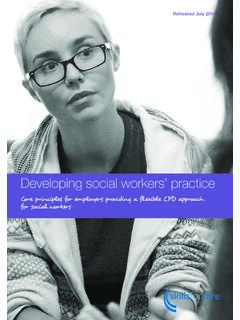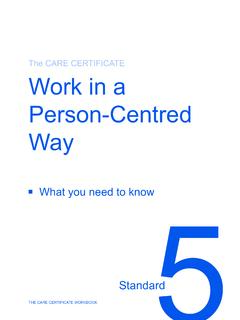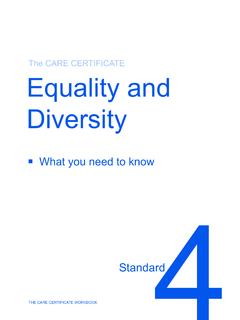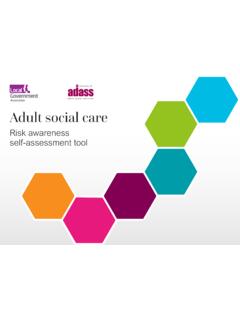Transcription of Developing resilience in practice - Skills for Care
1 Developing resilience in practice Examples from adult social care employers Introduction resilience is the ability to cope under pressure and recover from resilient will help staff to manage stressful situations, protect them from mental ill-health and improve their wellbeing. At work, this ensures that they continue to do their job well and deliver high-quality care and support. It s not possible to take all of the stress out of care work, which is why it s important that everyone in adult social care is supported to develop their resilience , and that employers take steps to reduce work-related stress. This guide is for team leaders and managers in adult social care organisations, and individual employers, to support them to build the resilience of their staff.
2 It explains what resilience is and shares examples of how other adult social care employers have developed the resilience of their workforce at an organisational and/or team level. It gives you templates and resources that they ve developed, which you can use with your team(s). We hope that reading the examples will help you to think about, and give you ideas about, what changes you can make in your organisation and/or team to build the resilience of staff. 2 Contents IntroductionContentsLearn from others: care Management Group Overview: resilience and mental health wellbeing programme Resources and templates to help Template organisational action plan for resilience Supervision questions about resilience , mental health and wellbeing Supervision discussion prompt resilience questionnaire Tips to build resilience Mental health: signs that someone may be struggling Ideas and activities to use in teams Emotional state: changing internal representations Emotional state: changing inner dialogue Emotional state: body scanLearn from others: Partners in care Overview.
3 Creating mentally healthy workplaces Resources and templates to help Good Employer Charter Employee prompt card Good communications charterLearn from others: Suffolk Brokerage (now care Development East) Overview: wellbeing project for social care managersLearn from others: Woodford Homecare Overview: resilience training to strengthen leadership skillsLearn from others: Independent Lives Overview: mindfulness training Resources and templates to help What is mindfulness?Conclusion and next steps3 Learn from others: care Management Group Overview: resilience and mental health wellbeing programmeThe care Management Group provides specialist support to adults and children with learning disabilities, autism and mental health needs in South East England, West of England and South identified that staff were facing situations which they found challenging every day, and that they needed to develop a culture that supports staff to develop their resilience .
4 They hoped that this would reduce staff turnover and improve the quality of their service. They worked with a consultancy company to develop and deliver a resilience programme to all staff across three services. The programme included: an organisational resilience course for senior managers, exploring ways to create a culture of resilience within their teams piloting new supervision and team meeting documents that included open questions relating to staff wellbeing exploring different ways to conduct supervisions, for example walk-and-talk , to encourage staff to be more open about how they re feeling and make supervisions more meaningful workshops for staff about mental health, wellbeing and signs of stress, including finding meaning in their role and what barriers they face mindfulness sessions at team meetings an enhanced focus on staff wellbeing at work, for example.
5 Managers encouraging staff to take regular breaks. The Group set up a wellbeing steering group to support this programme, developed an organisation-wide strategy and action plan, and produced a practical toolkit on building resilience in a social care a result of the programme, they reported an increased awareness of resilient behaviours amongst staff and managers, more productive supervisions, improved morale and productivity, reduced stress-related sickness and lower staff and templates to helpTemplate organisational action plan for resilience The care Management Group s steering group developed this organisational action plan to outline how they were going to develop staff resilience .
6 They used the Farmer review (2017) as a template. This review was commissioned by the Government to review how employers can improve the mental health of staff. It highlights a number of mental health core standards that can be adopted across all workplaces. Read what actions the care Management Group put in place to meet the standards, and use the template on page 9 to think about what you can do in your organisation and/or team. Example: The care Management Group action planStandard 1: produce, implement and communicate a mental health at work planActions: work with people across the organisation to develop a plan which outlines actions to promote improved mental health and wellbeing communicate the plan to staff, for example, at staff rep meetings.
7 Standard 2: develop mental health awareness among employeesActions: promote wellbeing messages through the intranet and posters launch a newsletter that highlights initiatives and promotes wellbeing produce a wellbeing toolkit deliver resilience workshops for teams deliver mindfulness sessions at team meetings deliver monthly mental health awareness workshops for managers and staff set up a resources hub that staff and managers can access. 5 Standard 3: encourage open conversations about mental health and the support available when employees are strugglingActions: ensure that supervisions give people the opportunity to discuss how they can be supported with their wellbeing look for ways to openly talk about mental health and wellbeing across the organisation launch a blog from the senior management team about how they remain well ensure that there are effective occupational health and employee assistance schemes in place that staff can use.
8 Standard 4: provide employees with good working conditionsActions: implement shift planning training so that those running shifts realise the importance of allowing breaks (where possible) and providing effective delegation and handovers ensure that rotas are provided four weeks in advance. Standard 5: promote effective people managementActions: train managers on individual and organisational resilience include resilience training on the managers development programme explore, at managers meetings, how they can create a culture of resilience in their service. Standard 6: routinely monitor employee mental health and wellbeingActions: review the staff survey so that it includes questions about how people are supported with their mental health and wellbeing monitor sickness trends across the organisation, in regions and services gain feedback from staff representative meetings and Driving Up Quality the template on the next page to start an action plan for your organisation and/or action planUse this template to think about what you can do in your organisation and/or team to build and support resilience , and write your ideas in the boxes below.
9 Download a copy of this template from 1: produce, implement and communicate a mental health at work planActions: Standard 2: develop mental health awareness among employeesActions:Standard 3: encourage open conversations about mental health and the support available when employees are strugglingActions:Standard 4: provide employees with good working conditionsActions: Standard 5: promote effective people managementActions: Standard 6: routinely monitor employee mental health and wellbeingActions: 7 Supervision questions about resilience , mental health and wellbeing The care Management Group wrote these questions for managers to ask staff in their supervision.
10 They aim to encourage staff to be more open about how they re feeling and give managers a better insight about how they can support them. You can use them to help you to identify what you re doing well and what you need to improve. What do you love about what you do? What stops you from having a good day? How do you protect yourself when you feel under pressure? How would you like to be supported if something does not go as planned? How do you think that you can work as a team to ensure that there s a culture that supports resilience and wellbeing?Write any other questions that you can think of here:..8 Supervision discussion promptIt s important to create an environment of support for staff, and to understand how they like to be managed and how they like to be supported if something doesn t go as planned.










